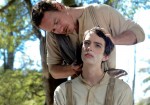As far as coming-of-age journeys go, 16-year-old Jay Cavendish’s odyssey from the windy highlands of Scotland to the barren plains of Wild West America has to rank as one of the bleakest and most unlikely.
In “Slow West,” director John Maclean focuses on life’s harsh realities on the American frontier in the 19th century. He manages to strike a precise balance between long pans of riders traveling alone in vast emptiness, scenes of stark brutality and unexpected moments of comedy which rely heavily on dramatic irony.
The film nods to its iconic predecessors in the Western genre through monosyllabic dialogue and warts-and-all close-ups; however, the tone is more active, making it feel more like the Coen brothers’ “True Grit” rather than Sergio Leone’s “Man With No Name” trilogy.
“Slow West” is the story of Jay’s (Kodi Smit-McPhee) unrequited love for Rose Ross (Caren Pistorius). It is a love so strong that when Rose and her father flee Scotland because of Jay’s wealthy uncle’s accidental murder, Jay pursues them all the way to America. He quickly finds himself held at gunpoint only to be saved by the mysterious Silas Selleck (Michael Fassbender), who agrees to accompany him on his quest.
Silas’ intentions are deliberately ambiguous for most of the movie, when he discovers a wanted poster for Rose and her father nailed to an outpost, the audience is tantalizingly left to wonder whether he is there to claim the reward or whether he has good intentions in helping Jay reunite with his beloved. As the unlikely pair make their inexorable way across harsh wilderness, over rocky crags and through impenetrable forests, they are followed by a gang of outlaws led by the crafty Payne (Ben Mendelsohn).
“Slow West” succeeds in living up to its name, while still keeping the audience nervous as to the fate of Jay and Silas. The film’s unhurried pace is unusual for modern-day cinema, but aptly conveys the two protagonists’ glacial progress across the vast expanses while also juxtaposing moments of violence to reflect the environment’s dangerous unpredictability. Maclean uses this contrast to build tension so that there is always a sense of an impending threat. At one point, Silas advises Jay, saying, “Kick over any rock and a desperado will crawl out and knife you right in the heart.”
However, at the center of the film is the idea that Jay teaches Silas more about life than vice versa. For the most part, the former is positioned as a weak yet determined boy whose naivete will inevitably get him killed, while the latter imparts advice based on his experience and resourcefulness. The dichotomy of their world views is epitomized in Jay’s statement, “There’s more to life than just surviving,” to which Silas replies, “Yeah, there’s dying.” However, by the end, Silas admits that he has learned more from Jay than he has from anyone else.
Overall, the cast members give solid performances; however, Fassbender is by far the standout. In embodying Silas’ rugged, uncouth character, Fassbender channels “Spaghetti Western” legends such as Clint Eastwood and Henry Fonda, while keeping his natural, whiskey-worn Irish brogue to memorable effect. Although he has proven himself a versatile actor, the role of Silas seems to be one which Fassbender was born to play, as his gruff tones, his fat cigars and his impressively coarse stubble combine for a convincing ensemble.
Maclean’s decision to deliberately incorporate a multiracial set of characters is also striking. On his travels, Jay, being himself Scottish, meets an Irishman, a deceptively friendly German, a family of Russians, a trio of African singers, some hostile Native Americans and of course, an untrustworthy bunch of Americans.
This serves to reinforce Silas’ view that out in the Wild West it doesn’t matter where you’ve come from or who you were in a previous life – what matters is survival and how quickly you can find your next cigar.
– William Thorne
